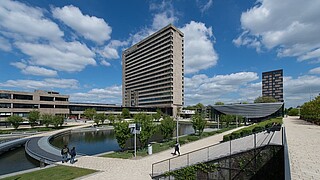A committee of academic directors and thesis coordinators reviewed the hundreds of theses written by students on the three master programmes taught by RSM’s Department of Technology and Operations Management; all the theses were assessed for theoretical contribution, methodological rigor and managerial impact. The four winning theses cover a broad range of business activities: using weather forecasts to predict online food orders and avoid food waste; a flowchart to help hospitals make the swap from single-use medical devices to reusable ones; a practical tool to help companies navigate the complexities of data monetisation, and an analysis that provides a better understanding of ways to more effectively seize the innovation opportunities that appear in times of crisis.
Predicting demand in a cloud kitchen
Valérie Dop’s thesis, Weather or Not: A Predictive Modeling Approach to Investigate the Impact of Weather and Air Quality on Cloud Kitchen Demand aimed to fill a gap in existing research on predicting demand in online food ordering. She used real-world data from a cloud kitchen in Ahmedabad, India to investigate the impact of external factors such as weather conditions and air pollution. She found that humidity significantly affects online food ordering, and found evidence that including external factors increases the predictive performance of demand forecasting models. Her findings extend existing literature on the effect of outside circumstances in the online food service industry and enable cloud kitchen managers to better forecast demand so they can optimise operational processes, increase customer satisfaction, and waste less food.
Switching to reusable medical devices
Mels Arnoldy’s thesis Material logistics infrastructure in a circular hospital is a practical evaluation and strategy flowchart for hospitals making the swap from single-use medical devices to reusable ones. Mels’ thesis involved designing the logistics infrastructure for materials used in hospitals so that single-use medical devices can be replaced with reusable ones that can be reprocessed, repaired, and recycled. What he developed was a solution flowchart, an important practical tool that hospitals can use to increase the circularity of the medical devices they use. “It also provides some practical implications for external stakeholders,” said Mels. “Businesses can identify new business opportunities, healthcare insurers and banks can allocate their innovation budgets accordingly, and governments and policymakers can adapt laws and regulations accordingly.”
Standardising the capitalisation of data assets
David Lensen’s thesis What is my data worth? The development of a conceptual model for determining pricing of dataintroduces a standardised method for pricing data – which is a valuable asset in the digital economy. David produced a practical tool to help companies navigate the complexities of data monetisation, ensuring they can ethically and effectively capitalise on their data assets. “I focused on the factors that influence data value, and my research develops a comprehensive framework for determining the selling price of data,” he explained. “I cared about providing a practical tool to help companies navigate the complexities of data monetisation and ensuring they can ethically and effectively capitalise on their data assets so that personal data is handled with care and respect for privacy.” His framework also promotes a sustainable data market and encourages ethical practices in data monetisation.
Innovation opportunities in times of crisis
Daniel Sieczkowski’s thesis Diffusion of healthcare innovations during crisis - A multiple-case study of general practitioners during the Covid-19 pandemic investigates how crises can accelerate adoption of healthcare innovations in general practices. He found the effect is only temporary and it relies on the enthusiasm of a few general practitioners who like to innovate anyway. But their efforts do pave the way for further innovations. Daniel’s research contributes to understanding and finding ways to more effectively seize the innovation opportunities that appear in times of crisis.
About the award
The awards commemorate Prof. Jo van Nunen (1945-2010) who was Professor of Operations Research and Information Systems at RSM, and who is considered one of the founding fathers of RSM. He was well known for his energy and enthusiasm for bridging management science and management practice. He inspired many generations of students, faculty, alumni, managers, and entrepreneurs.
Read more about this and the latest research insights research on our RSM Discovery webpages. www.rsm.nl/discovery

